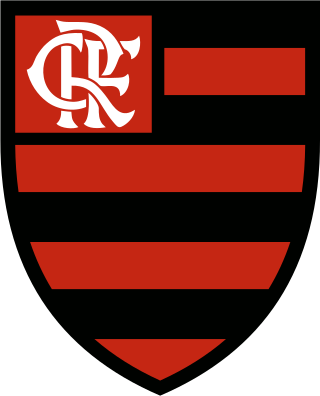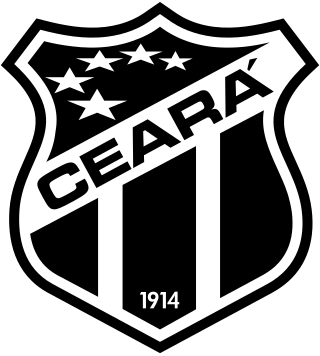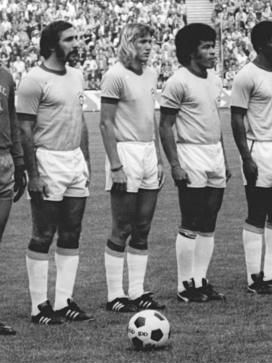Related Research Articles

Botafogo de Futebol e Regatas is a Brazilian sports club based in the neighborhood of Botafogo, in the city of Rio de Janeiro. Although they compete in a number of different sports, Botafogo is mostly known for its association football team. It plays in the Campeonato Brasileiro Série A, the top tier of the Brazilian football league system, and in the state of Rio de Janeiro's premier state league. In 2000, Botafogo finished 12th in a vote by subscribers of FIFA Magazine for the FIFA Club of the Century. They have won the Brazilian championship two times, in 1968 and 1995.

Clube de Regatas do Flamengo, more commonly referred to as simply Flamengo, is a Brazilian multi sports club based in Rio de Janeiro, in the neighborhood of Gávea, best known for their professional football team. They are one of two clubs to have never been relegated from the top division, along with São Paulo. Flamengo is the most popular team in Brazil with more than 46.9 million fans, equivalent to 21.9% of the population that supports a team in Brazil.

Nílton dos Santos was a Brazilian footballer who primarily played as a wingback. At international level, he was a member of the Brazil squads that won the 1958 and 1962 World Cups.

Carlos Alberto "Capita" Torres, also known as "O Capitão do Tri", was a Brazilian football player and manager who played as an attacking right-sided full-back or wing-back. A technically gifted defender with good ball skills and defensive capabilities, he is widely regarded as one of the best defenders of all time. He also stood out for his leadership, and was an excellent penalty taker. Nicknamed O Capitão, he captained the Brazil national team to victory in the 1970 World Cup, scoring the fourth goal in the final, considered one of the greatest goals in the history of the tournament.

Mário Jorge Lobo Zagallo was a Brazilian professional football player, coordinator and manager, who played as a forward.

José Roberto Gama de Oliveira, known as Bebeto, is a Brazilian former professional football player who played as a forward. He entered politics in the 2010 Brazilian general elections and was elected to the Legislative Assembly of Rio de Janeiro representing the Democratic Labour Party.

Ceará Sporting Club, or simply Ceará, is a Brazilian professional football club from the city of Fortaleza, capital city of the Brazilian state of Ceará.

Renato Portaluppi, known as Renato Gaúcho, is a Brazilian professional football coach and former player who is currently in charge of Grêmio.

Dirceu José Guimarães, known as Dirceu, was a Brazilian footballer who played as an attacking midfielder, notably for Botafogo and the Brazil national team as well as numerous Italian teams in the 1980s–early 1990s.

Marco Antônio Feliciano, known as just Marco Antônio, is a former Brazilian footballer. He played as a left-back for Fluminense Football Club and the Brazil national team. He won the 1970 FIFA World Cup at international level, while at club level, he is a five-time winner of Campeonato Carioca and received the “Brazilian Silver Ball” in 1975 and 1976.

Francisco das Chagas Marinho, generally known as Marinho Chagas or Francisco Marinho, was a Brazilian professional footballer. One of the best left-backs of his era, he is best known for his flowing curly blond hair and his performance at the 1974 FIFA World Cup, in which Brazil finished fourth. At club level he is mostly associated with Botafogo FR of Rio de Janeiro and São Paulo FC, but he played for numerous other teams, as well as in the North American Soccer League, in a career which spanned from 1969 to 1987.
The 1971 Campeonato Brasileiro Série A was the 16th edition of the Brazilian Championship. However, from 1976 until 2010 this tournament was considered by the highest entity of national football as the first edition of the Campeonato Brasileiro Série A. The competition was won by Atlético Mineiro, thus winning its second Brazilian title.

Aymoré Moreira was a Brazilian football player and coach, who played as a goalkeeper. He was a brother of Zezé Moreira and Ayrton Moreira, both of whom were also successful coaches in Brazilian football.
Acácio Cordeiro Barreto, best known as Acácio, is a Brazilian former professional footballer who played as a goalkeeper, best known for his performances for Vasco da Gama.

Roberto Lopes de Miranda, sometimes known as just Roberto or Roberto Miranda is a former association footballer who played as a midfielder or striker. His nickname was "Vendaval".
Édson Boaro, best known as Édson or Édson Abobrão, is a former Brazilian football defender.
Jorge Henrique de Souza, or simply Jorge Henrique, is a former Brazilian footballer who played as a midfielder.

Danilo Alvim Faria was a Brazilian footballer. He was a member of the ill-fated Brazilian 1950 World Cup team. One of the greatest center-halves in the World during his prime, he was renowned as a very sophisticated and elegant player who possessed fine ball control and accurate long range passing.

Waldyr Pereira, also known as Didi, was a Brazilian footballer who played as a midfielder or as a forward. He played in three FIFA World Cups, winning the latter two.

Paulo Silas do Prado Pereira, also known as Paulo Silas, Silas Pereira or simply Silas, is a Brazilian football pundit, coach, and former professional player.
References
- 1 2 "The blondes came and the training went – I wasted it all: Josimar on Mexico 86". FourFourTwo. 3 June 2014. Retrieved 26 August 2014.
- ↑ "World Cup Cult Heroes: Josimar | The National". thenational.ae. Retrieved 26 August 2014.
- ↑ "Futpedia: Josimar (Josimar Higino Pereira)". Globo Esporte (in Portuguese). Archived from the original on 31 January 2009. Retrieved 24 January 2010.
- ↑ Josimar – FIFA competition record (archived)
- ↑ "South American Team of the Year". 16 January 2009. Archived from the original on 21 January 2015. Retrieved 10 December 2015.
- Josimar at National-Football-Teams.com